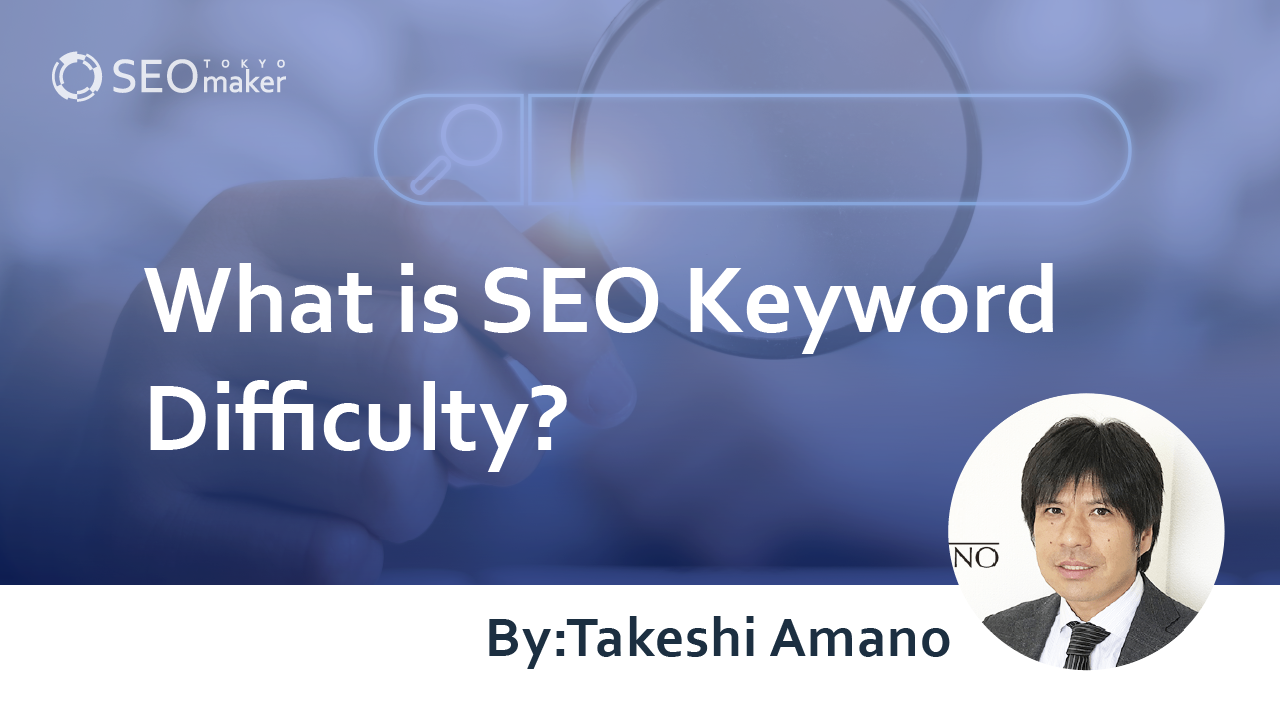What is SEO Keyword Difficulty? How to Succeed with High-Difficulty Keywords
contents
 Embarking on SEO entails various challenges, including site design, construction, and content creation. However, before beginning, it’s crucial to consider quality, required time, and cost. QCD (Quality, Cost, Delivery) is fundamental in business and equally applicable to SEO.
Embarking on SEO entails various challenges, including site design, construction, and content creation. However, before beginning, it’s crucial to consider quality, required time, and cost. QCD (Quality, Cost, Delivery) is fundamental in business and equally applicable to SEO.
The required time refers to the period until the site ranks high in search results and attracts stable traffic. One must ponder the cost and the quality of content that can be provided. If deemed unfeasible at the planning stage, it might be advisable not to pursue SEO.
The deciding factor on whether to commence is the difficulty level of SEO.
SEO consultants emphasize that keyword difficulty can vary significantly, making simple numerical comparisons from tools insufficient. Nonetheless, various tools are essential for generating necessary metrics. Tokyo SEO Maker will explain keyword difficulty and successful strategies for difficult fields.
What is Keyword Difficulty?
Keyword difficulty is an indicator of how challenging it is to achieve a high ranking in search results for a targeted keyword.
Keywords with low difficulty can rank higher even with lower quality articles, weaker domains, and poor site usability. As difficulty increases, even exhaustive efforts might require a considerable amount of time to achieve high rankings.
Taking into account keyword difficulty and profitability when strategizing is crucial for successful web traffic acquisition, making pre-SEO planning vital.
High Search Volume ≠ Difficult
The average monthly search volume can be easily determined using Google Ads’ Keyword Planner. A high search volume indicates demand, attracting large companies and affiliates, thus increasing competition.
However, a high search volume does not necessarily equate to high keyword difficulty.
Even with high search volume, niches that are hard to monetize or require specialized knowledge might see fewer new entrants, allowing for SEO success through the delivery of highly specialized articles.
High Number of Search Results ≠ Difficult
The number of search results refers to the total count displayed by Google upon searching. For instance, searching “SEO” might return nearly 600 million results. A high number of search results indicates a large volume of articles. Original content is essential for ranking high, as without it, content may be deemed duplicate. However, a high level of competition signifies that creating unique content becomes more challenging.
Nonetheless, the quantity of search results does not necessarily correlate with the number of articles meeting user needs. The real threat comes from media that distribute articles capturing user needs, which are beyond what our company can produce. Conversely, if it is evident that our company can deliver superior articles, in most cases, they do not pose a significant threat.
High Competition ≠ Difficult
However, a high number of competitors does not necessarily mean that SEO is difficult. Even within the exact same genre, the strategy for a site changes depending on whether it is a company or an individual. The difficulty varies depending on whether you are targeting big keywords or focusing on middle or small keywords.
Difficulty is Determined by an Overall Score
SEO difficulty requires a comprehensive assessment, thus cannot be judged solely on search volume, number of results, or competition.
The following section will explain how to determine keyword difficulty. Using various tools to generate metrics and assess the feasibility of outperforming competitors is essential.
How to Determine Keyword Difficulty
Relying solely on tool metrics is insufficient for determining keyword difficulty. However, these tools undoubtedly provide valuable data.
It’s crucial to analyze from multiple perspectives and consider different angles to make an informed decision.
Strength of Competing Domains
The strength of a domain significantly influences search rankings. Knowing the domain power of competitors is crucial.
Ahrefs, Moz (Link Explorer), and Majestic are renowned for this purpose, with domestic tools like Domain Power Check Tool also available in Japan. Each offers unique insights, so checking all, if possible, is advisable.
Ahrefs is a paid tool centered around backlink analysis, offering metrics like UR (URL Rating) and DR (Domain Rating) for comparing the strength of competing sites and one’s own site.
UR: URL Rating – Quantifies the strength of the examined URL based on its backlinks.
DR: Domain Rating – Quantifies the strength of the domain based on the quantity and quality of external links.
Moz (Link Explorer)
Moz’s Link Explorer provides PA (Page Authority) and DA (Domain Authority) metrics, quantifying authority based on backlinks. Though a paid tool, PA and DA can be checked for free using a Chrome addon.
PA: Page Authority – Quantifies the strength of a URL based on its backlinks
DA: Domain Authority – Quantifies the strength of a domain based on its backlinks
Majestic
Majestic evaluates backlinks using two metrics: Trust Flow (TF) and Citation Flow (CF). While it is a paid tool, a free version is available for basic research.
TF: Trust Flow quantifies the quality of backlinks
CF: Citation Flow quantifies the number of backlinks.
Domain Power Check Tool
The Domain Power Check Tool, although free, is limited to one use per day. It numerically evaluates the strength of a domain based on proprietary criteria.
Volume of Competitor Indexes
The number of articles on competitor sites can be approximated by checking the number of indexed pages. While the index count doesn’t directly determine difficulty, it indicates the level of article distribution among top competitors, serving as a benchmark for the minimum content needed by your company.
site: Search
The simplest method to investigate the number of competitor indexes is to use the “site:” search command in Google, placing it before the competitor’s domain.
This allows for displaying the number of pages indexed by Google.
SEO Checki
The well-known free tool, SEO Checki, can perform a similar function to the “site:” search, offering convenience for broader research needs beyond index counts.
Quality of Competitor Content
It is recommended to visually assess the quality of competitor content. While tools can provide insights, assessing aspects such as UI/UX requires human judgment.
However, for backend aspects, tools can be beneficial for quicker analysis.
High Evaluation
The free SEO tool, High Evaluation, offers numerical evaluations of SEO effectiveness based on URL and keyword inputs. Although not directly related to search ranking, it can reveal areas for improvement and issues.
Strategies for Succeeding with Difficult Keywords
Ideally, keyword selection and competitor/difficulty assessment should occur before undertaking SEO efforts. If achieving success seems too challenging or time-consuming, it may be best to avoid entering the field from the start.
However, in corporate settings, decisions on keywords and starting SEO can be made without thorough consideration, sometimes resulting in more significant challenges than “boss roulette.” Keywords with excessively high difficulty may make it impossible to achieve high rankings.
If you must aim for high-ranking positions with difficult keywords, consider the following four points;
1. Avoid YMYL field
2. Conduct thorough competitive research on E-A-T
3. Do not target big keywords.
4. Consider user needs extensively.
Avoid YMYL (Your Money or Your Life) fields
YMYL stands for Your Money or Your Life. This refers to genres deeply related to finances, assets, and life.
Sectors requiring high expertise, such as healthcare and law, or those significantly impacting life decisions, like wealth formation, generally should not be entered by newcomers.
Succeeding in SEO within YMYL fields requires sufficient financial resources, ample preparation time, and a deeply understanding leadership (exceptions exist but are omitted here).
If a decision to enter a YMYL field is made, the responsible person must accurately grasp the situation and gain company understanding. Many companies have attempted to enter YMYL fields without meeting these conditions and have generally failed to succeed.
Initial success is usually limited to those with a foundation in similar genres or authority within the genre.
Conduct thorough competitive research on E-A-T
E-A-T stands for Expertise, Authoritativeness, and Trustworthiness. This concept becomes particularly critical in YMYL fields.
Given the significant impact on users’ life decisions, Google prioritizes the opinions of leading experts and specialists in these fields for search rankings. This involves gathering information from various aspects, including sites, links, and affiliations.
While E-A-T is crucial in YMYL and non-YMYL fields alike, it’s essential to assess how much effort competitors are putting into these areas, whether your company can match or exceed their level.
Avoid targeting big keywords
Some aim for big keywords in SEO strategies. Even if big keywords are the ultimate goal, the journey always involves battles over small and middle keywords.
Directly aiming for big keywords and succeeding is challenging. Without strategizing for necessary middle keywords, achieving success is tough, and even if high rankings for big keywords are achieved, revenue can drop significantly if rankings fluctuate after a core update.
Regardless of the final goal, it’s crucial to solidify the groundwork with small and middle keywords to build a site capable of handling emergencies.
Consider user needs thoroughly
Regardless of the keyword difficulty, capturing user needs is essential for achieving high rankings. External and internal strategies, technical SEO, and content SEO vary, but all aim to satisfy user needs.
Focusing solely on search engine optimization due to the difficulty of keywords can lead to significant setbacks during core updates and make it challenging to expect traffic from social media.









![What is a Description? Explaining the Meaning, Writing Style, and Changing Word Count – [2023 Edition]](https://www.switchitmaker2.com/en/wp-content/uploads/2024/09/what-is-description.webp)










